Rail Forum hosted its 2024 Annual Conference at Doncaster Racecourse on Tuesday 15 October 2024. The theme of the day was ‘Harnessing the Power of the SME Community’, a topic that was obviously well received, as evidenced by the healthy turnout from Forum members.
The huge space under the main grandstand, turned over exclusively to Rail Forum for the day, gave plenty of room for a conference hall that comfortably seated the 400 delegates, exhibition space for over 50 companies and a large networking area.
Will Rogers, Rail Forum chairman and managing director of East Midlands Railway, welcomed delegates and thanked event sponsors Mitie, Sika and Business Doncaster, saying that their involvement had been crucial to the staging of this year’s conference.
He then introduced City of Doncaster Deputy Mayor Glyn Jones, who also welcomed everyone and reminded them that over 50 railway companies are based in Doncaster. Several large companies are underpinned by a vibrant SME community, he said, leading to strong and meaningful partnerships all across the industry
.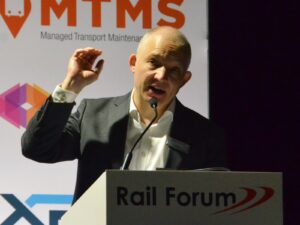
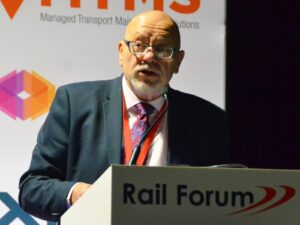
Embracing Innovation
The first of the day’s four sessions – ‘Embracing Innovation: Creating a Better Customer Experience’ – opened with a presentation by Richard Hastings, head of logistics for Nestlé UK & Ireland. He told his audience that Nestlé had an aspiration to move back from road haulage, “where we have been for the last 40 years”, into rail.
Nestlé owns the Buxton, San Pellegrino and Perrier water brands, amongst others, and that means moving a lot of bulk and weight. Transferring to rail will not only reduce the company’s CO₂ emissions but also makes sense when considering the Peak District road network around Buxton.
In addition, there is a shortage of road haulage drivers – the new demographic of young drivers is not keen on 12-hour shifts and overnight stops. Niall McCarthy has been appointed as Nestlé’s rail development and delivery manager, and he is looking to increase Buxton mineral water shipments, although currently that would have to be from the inland rail terminals at Hams Hall (70 miles) and East Midlands Gateway (50 miles).
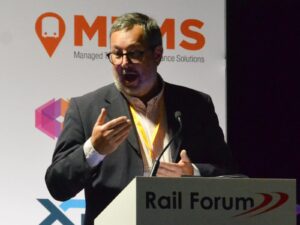
Michelle Craven-Faulkner, Rail Forum’s vice chair, then introduced James McCaffery, UK head of programmes at Stadler. He started his presentation with a brief history of the company, which was founded 80 years ago and has, he admitted, a European focus. It now needs to develop a UK supply chain, he said, although this could be difficult for programmes such as the FLIRT trains, which are ‘off the shelf’ designs and so use a well-established network of suppliers.
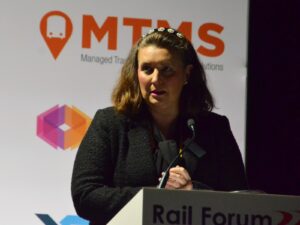
However, a number of Stadler’s products are bespoke – specially designed for a single customer – and these programmes would be easier for UK suppliers to become involved with as everything is designed and procured specially. In addition, the UK service teams also want a supply of locally sourced products and equipment.
But UK suppliers do have one major challenge, he stated. When Stadler specifies a product, it defines exactly what it wants. UK suppliers have a habit of wanting to supply something better – something “gold plated” – and therefore expect a higher price for that. To supply Stadler, companies must resist this temptation and quote for products to the quality level specified and at an acceptable cost.
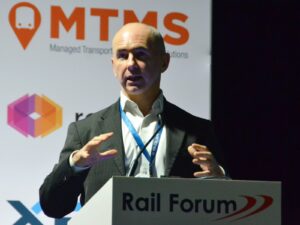
A panel session followed, with James McCaffery and Richard Hastings joined by Network Rail chief technology officer Robert Ampomah and Innovate UK innovation and growth specialist Ian Evley.
Both Robert and Ian introduced themselves and considered what is meant by innovation. Robert felt it is a ‘can do’ attitude, finding new ways to do what was previously thought to be difficult, challenging or even impossible.
Ian believes that innovation has to do with changing people and their attitudes. “Innovation is not Invention,” he said, adding that “SMEs don’t do innovation, they are innovative”.
Challenged to say what the rail industry can do better, Richard said that “we should recognise what we’ve got and understand what can be done,” adding that being innovative was all about mind set. James said that things should be kept simple, delivering innovation more quickly and doing the minimum needed to meet the specification – a refence to his ‘gold plating’ comments from earlier.
Robert said that everyone needed to be more outcome-focussed, leaving innovators to innovate rather than trying to dictate how things are done,
Both Ian and Richard commented that, although innovation can cost a little more up front, it can reduce costs in the long term – “Innovation gives us the opportunity to get the best outcomes for the lowest cost,” said Ian.
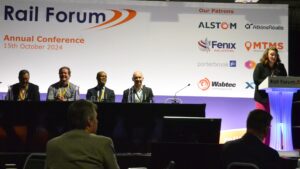
Government View
The conference’s keynote speech was delivered by Alex Hynes, former managing director of Scotrail and now director-general of rail services at the Department for Transport and a member of Shadow GBR. He started by emphasising that the government firmly believes that rail transport is key to achieving economic growth. Through its commitment to rail reform, it seeks to improve performance, have better integration between modes of transport, enhance regional activity and achieve a greener outcome.
He then outlined the new Shadow GBR structure, in which he will be joined by Network Rail chief executive Andrew Haines and the head of the DfT’s operator of last resort Robin Gisby. Shadow GBR will be chaired by Laura Shoaf, CEO of the West Midlands Combined Authority.
“We need to make rail more accessible,” he said, adding that the Secretary of State could be considered as being the “passenger in chief”.
GBR will have a major role in promoting trust in the railway, he added, with new ways of working creating a simplified and unified structure. GBR will be an arms-length body – a guiding mind that will bring track and train back together. There will be a significant role for the private sector, particularly in terms of investment in light of the current challenging financial circumstances in which the government find itself.

Exporting UK Rail
The conference’s second session was ‘Celebrating Manufacturing: Generating Wealth for the UK’. Kelly Warburton, chief commercial officer for the Global Centre of Rail Excellence (GCRE) currently under construction in South Wales, updated the conference on recent developments, explaining that GCRE will be a unique facility where all types of equipment can be tested in one location.
An initial investment of £70 million from the Welsh and UK Governments will shortly be augmented by funding from a private source. When this is confirmed, construction of the facility will ramp up and GCRE will invite interest from organisations across the world. Several overseas-based companies have already been in contact, confirming that GCRE has export potential as well as offering support to the UK supply chain.
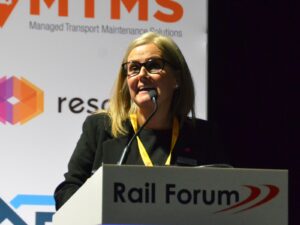
Kelly was then joined on a panel by Sam Kirk, managing director of J-Flex Rubber Products, Simon Burke, Head International Rail Partnerships at the Department for Business and Trade, and Veronica Elena Bocci, Vice-President of the European Railway Clusters Initiative (ERCI). The session was moderated by Lucy Prior, business growth director at Trough-Tec Systems.

A discussion on how UK companies, particularly SMEs, should approach export markets ensued. Simon Burke advised that overseas trade advisers are there to help and can assist in identifying markets.
Veronica stressed the importance of choosing a potential export market carefully. It is important to understand the culture and language of the chosen country – one reason why many UK companies concentrate on the USA and Commonwealth countries first.
Sam Kirk agreed, stating that J-Flex currently exports to 40-50 countries and that having various languages available on the company’s website certainly helped access those markets as it made things easy for the potential customer.
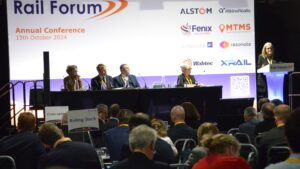
Elaine Clark, Rail Forum’s chief executive, then announced that three companies had been recognised by the ERCI for their innovative approach. Paul Warren of KeTech and Ben Craze of Infinitive Group were presented with Innovation Award certificates by Veronica Elena Bocci and congratulated by delegates – Complete Cyber who were not in attendance will also receive their certificate.
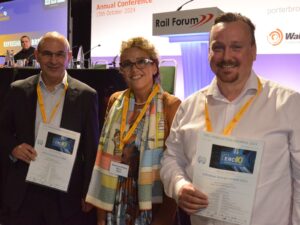
Celebrating Manufacturing
After a networking break, which gave delegates time to look over some of the exhibits displayed adjacent to the conference hall, the third session of the morning was ‘Celebrating Manufacturing: Generating Wealth for UK PLC’.
Geoff Newman, chief operating officer of Transport Design International (TDI), admitted that “manufacturing is a tough gig”. He introduced the work that TDI is doing on very light rail, including the Revolution vehicle currently on test at Ironbridge in Shropshire, that will give new low-cost travel opportunities to cities and rural communities alike.
“A train line represents permanence,” he said, adding that new rail links can promote new housing and industry.
However, he was concerned that orders for new trains are lagging behind passenger demand. “We have an aging fleet,” he said.
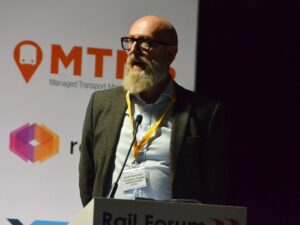
John Pearce of Made in Britain said it is important to know what is made in the UK and what isn’t. Supporting the UK supply chain is critical for the future, he added, as the global market becomes even more complex.
Joanne Farms of Hydram Engineering said that everyone should take pride in what they are making and called for better training to ensure that the quality of UK-manufactured goods remains high.
Understanding the concept of whole-life cost is crucial, Steve Barbour of Composite Braiding emphasised. As it has moved from low to high-volume manufacture, his company has adopted new processes such as 3D printing and embraced new materials including graphenes. “It’s all a question of having the right material in the right place at the right time,” he commented.
Before delegates adjourned to lunch, a short address from Anna Gray, East Midlands chair of the Young Rail Professionals, encouraged everyone to help inspire the next generation of rail industry employees. She particularly drew delegates’ attention to the INTOrail initiative, with YRP ambassadors attending events at schools, colleges and science fairs to promote rail as a future career.
During Railweek, YRP promotes a week of rail-related activities for school, college and university students, delivered by organisations within the rail industry. Anna urged delegates to get their own companies involved.
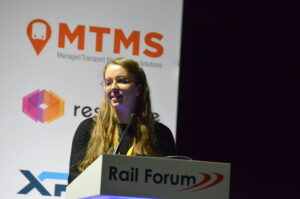
Following this inspiring presentation, delegates broke for lunch and a second opportunity to network and look around the exhibition.
Rebuilding Futures
Following the break, Chris Leech, head of responsible business practice for Tracsis, introduced delegates to the work of the Rebuilding Futures Alliance, which works to bring ex-offenders back into the workforce and give them a life and a career.
It is a worrying statistic that 45 percent of prisoners reoffend withing 12 months of release, with 60 percent of former prisoners back in prison within two years. This reoffending costs the UK economy £18.1 billion each year.
However, if those former prisoners secure lasting jobs and a career, reoffending goes down to one in five.
It’s a major problem, with over 12 million people in the UK having spent convictions. The Rebuilding Futures Alliance streamlines support into employment, mitigating risks where reasonably practicable. “The rail industry can change people’s lives,” Chris said, urging employers in the room to investigate how they can help.
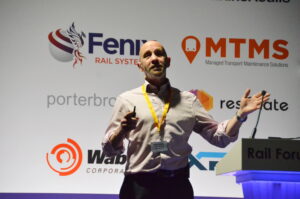
Encouraging Collaboration
The fourth and final session of the day explored the topic ‘Encouraging Collaboration: Forming Partnerships Across the Supply Chain’. It started with a fireside chat between CrossTech managing director Hayden Bartlett-Tasker and Network Rail route director (East Midlands), Mark Budden. They discussed how collaboration is a good way of developing a new product or technique, stressing that trust between the collaborators, turning a collaboration into a partnership, was essential for the best results.
Chris Beales, head of digital services at Porterbrook, and Sam Bussey, sales director of Instrumentel, presented a case study of their joint strategic plan to digitise the Turbostar platform, driving down whole-life maintenance costs while improving reliability.
“A project needs a leader but also contributors” was their message, stressing that team members need to have the success of the project as a goal rather than wanting individual success, so that the teams will then share the rewards of the successful partnership. “No one is good at everything all the time” was one of the points that Chris and Sam emphasised, accentuating that complimentary skillsets create a strong, cohesive offering for customers.
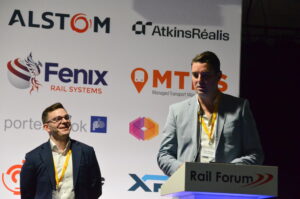
Sam and Chris were joined for the final panel session of the day by Matthew Labuda, head of customer service at Angel Trains, Unipart Rail head of product Nicola Kissaglis and moderator Paul Harwood, director of partners and places for the GBR Transition Team. Nicola recounted her experience of a recent Unipart Rail collaboration with AtkinsRéalis and Newgate to develop the ‘level crossing in a box’, a standardised complete level crossing system that is simple to specify and quick and easy to install.
When setting up a collaboration, “start with what you can all agree on and leave the grey areas until later” was the advice that the panel gave the audience.
With the final session concluded, it fell to Rail Forum board member Simon Higgens to look back over the day, reiterating what he felt were the key points. “Innovation is a mindset not a process,” he said. “It’s a way of thinking not of doing.”
Referring to the presentation by Richard Hastings of Nestlé, he questioned why the principal goal was to move water by rail. “Why not Quality Streets?” he asked.
He urged Stadler to develop a local, UK-based supply chain and wished GCRE success attracting global attention. He reminded delegates to choose export markets carefully, being mindful of local language and culture, and commented that manufacturing was the ultimate collaboration with raw materials, components and sub-assemblies all coming together to create a whole product. “It wouldn’t work without collaboration,” he said.
Simon’s key takeaways were a good way to close the 2024 Rail Forum Annual Conference. All delegates then had to do was add the date 9 October 2025 into their diary for next year’s conference, once again to be held at Doncaster Racecourse.
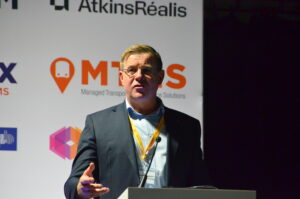
Credit: Nigel Wordsworth, Rail Industry Journalist and Commentator
